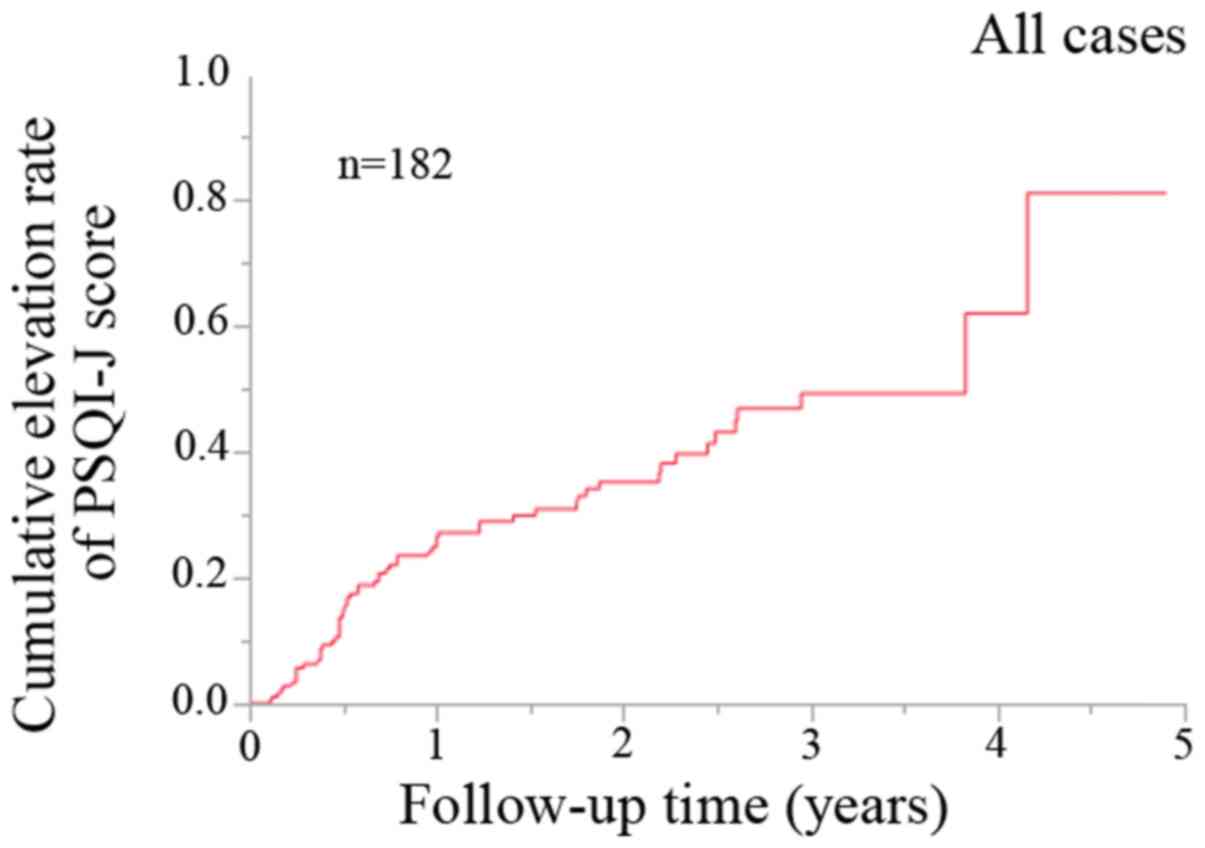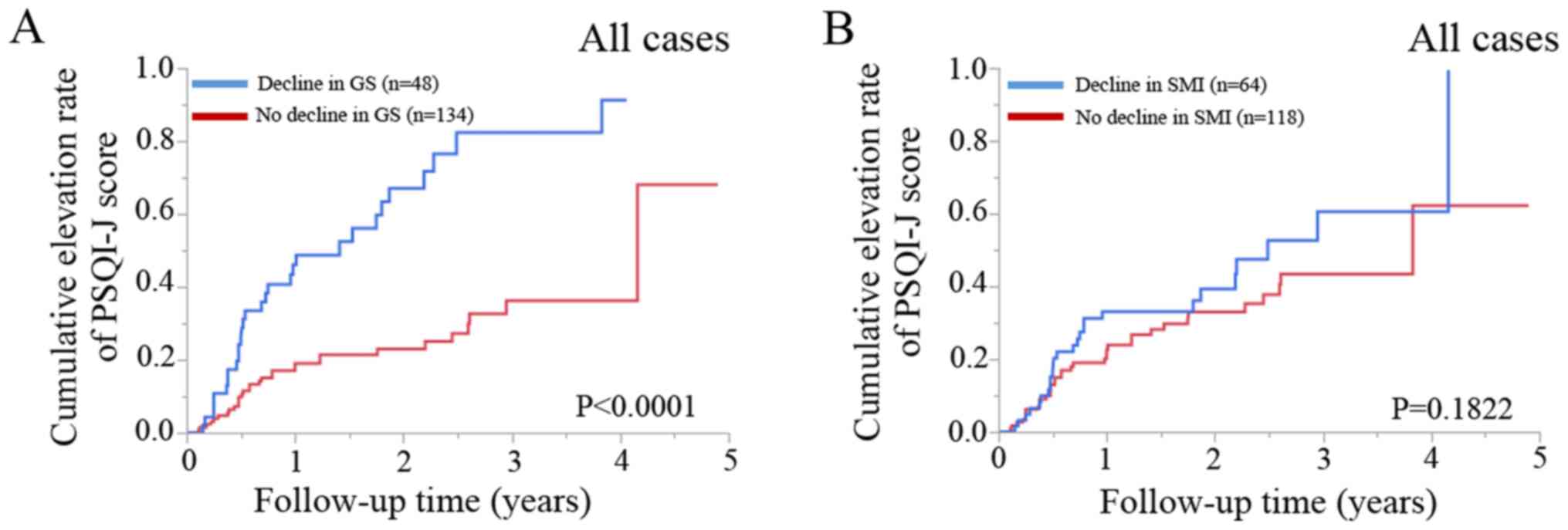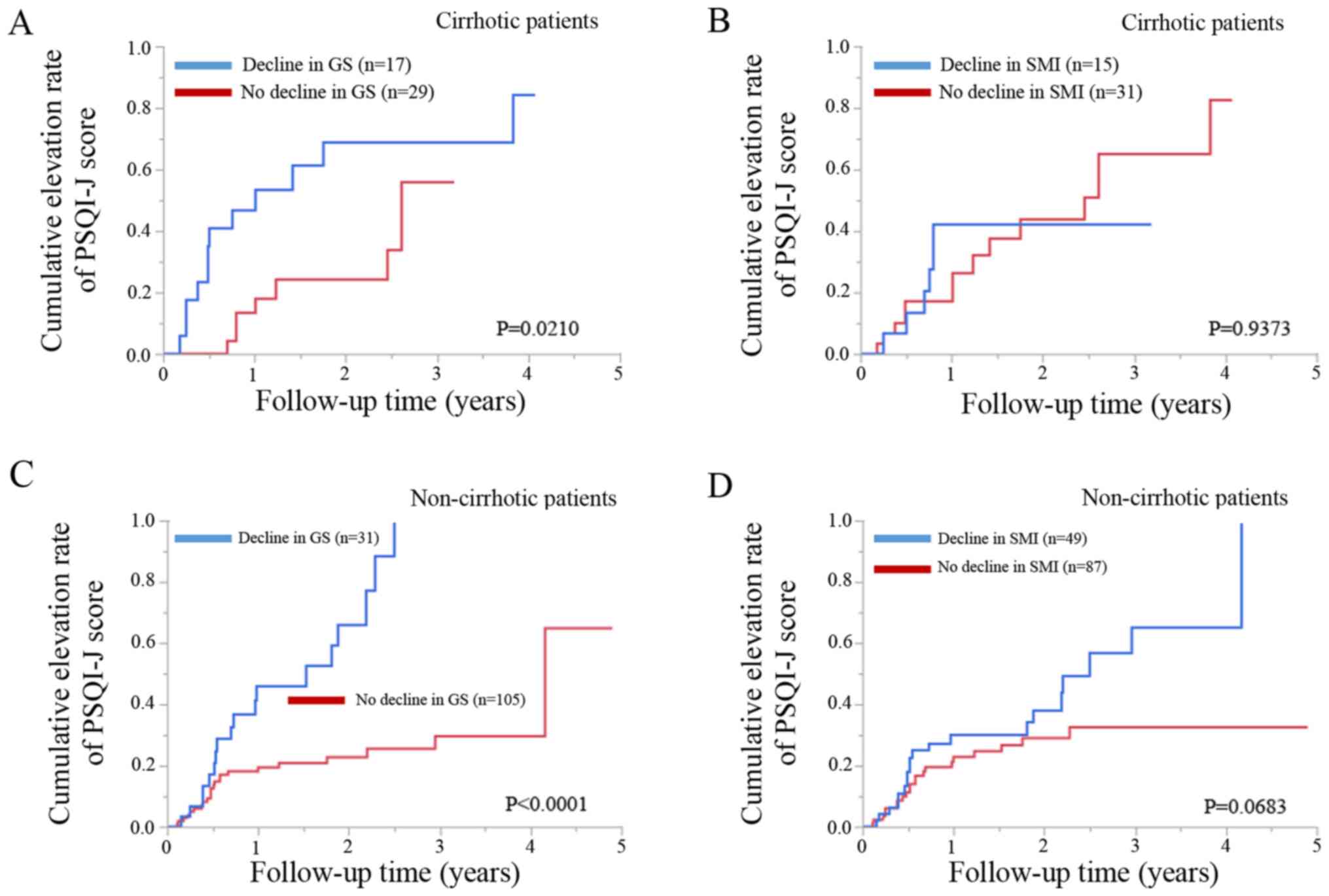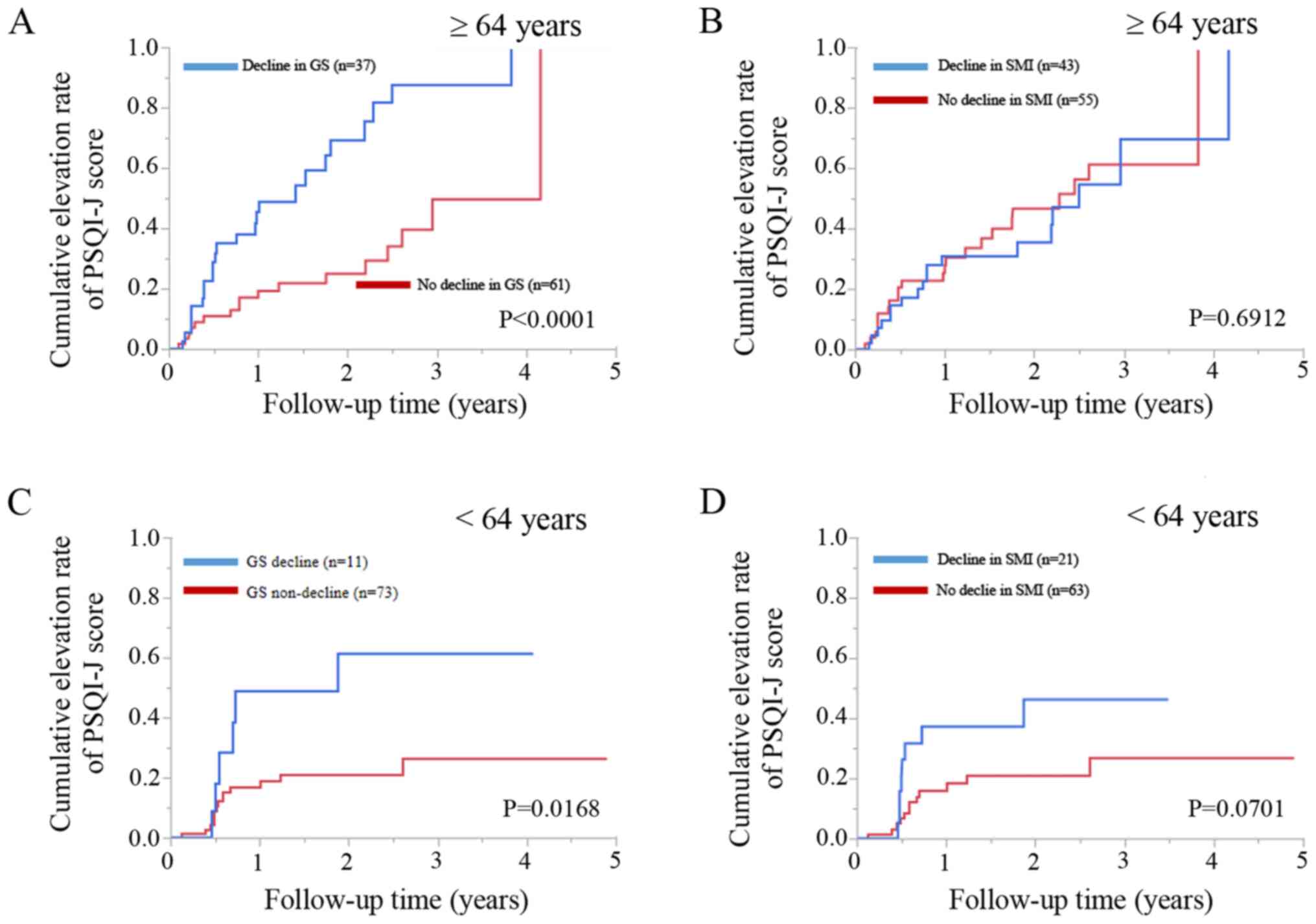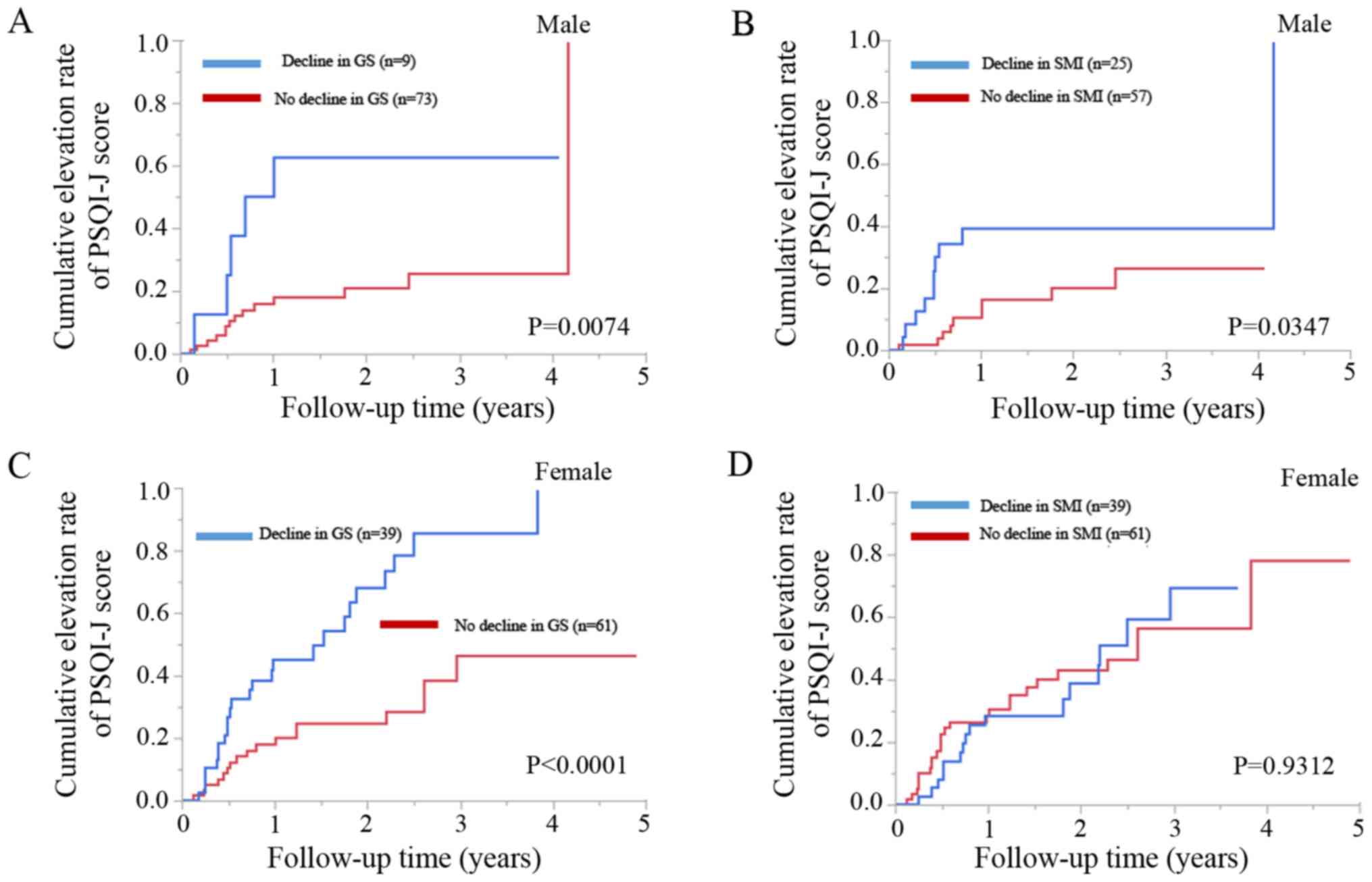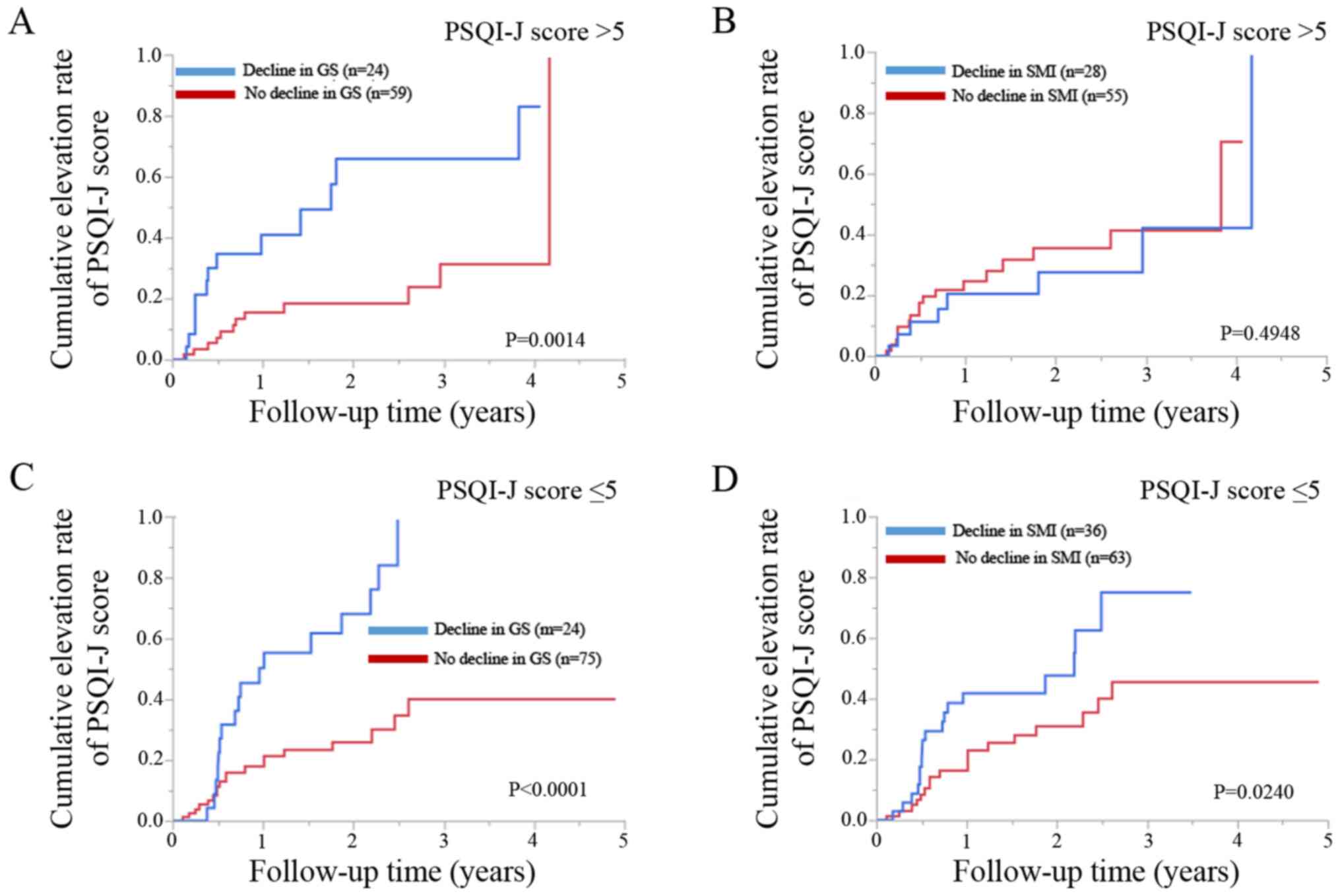|
1
|
Iwasa M, Karino Y, Kawaguchi T, Nakanishi
H, Miyaaki H, Shiraki M, Nakajima T, Sawada Y, Yoshiji H, Okita K,
et al: Relationship of muscle cramps to quality of life and sleep
disturbance in patients with chronic liver diseases: A nationwide
study. Liver Int. 38:2309–2316. 2018.PubMed/NCBI View Article : Google Scholar
|
|
2
|
Ghabril M, Jackson M, Gotur R, Weber R,
Orman E, Vuppalanchi R and Chalasani N: Most individuals with
advanced cirrhosis have sleep disturbances, which are associated
with poor quality of life. Clin Gastroenterol Hepatol.
15:1271–1278.e6. 2017.PubMed/NCBI View Article : Google Scholar
|
|
3
|
Córdoba J, Cabrera J, Lataif L, Penev P,
Zee P and Blei AT: High prevalence of sleep disturbance in
cirrhosis. Hepatology. 27:339–345. 1998.PubMed/NCBI View Article : Google Scholar
|
|
4
|
Montagnese S, Middleton B, Mani AR, Skene
DJ and Morgan MY: Sleep and circadian abnormalities in patients
with cirrhosis: Features of delayed sleep phase syndrome? Metab
Brain Dis. 24:427–439. 2009.PubMed/NCBI View Article : Google Scholar
|
|
5
|
Tordjman S, Chokron S, Delorme R, Charrier
A, Bellissant E, Jaafari N and Fougerou C: Melatonin: Pharmacology,
functions and therapeutic benefits. Curr Neuropharmacol.
15:434–443. 2017.PubMed/NCBI View Article : Google Scholar
|
|
6
|
Shigiyama F, Kumashiro N, Tsuneoka Y,
Igarashi H, Yoshikawa F, Kakehi S, Funato H and Hirose T:
Mechanisms of sleep deprivation-induced hepatic steatosis and
insulin resistance in mice. Am J Physiol Endocrinol Metab.
315:E848–E858. 2018.PubMed/NCBI View Article : Google Scholar
|
|
7
|
Mollayeva T, Thurairajah P, Burton K,
Mollayeva S, Shapiro CM and Colantonio A: The Pittsburgh sleep
quality index as a screening tool for sleep dysfunction in clinical
and non-clinical samples: A systematic review and meta-analysis.
Sleep Med Rev. 25:52–73. 2016.PubMed/NCBI View Article : Google Scholar
|
|
8
|
Buysse DJ, Reynolds CF III, Monk TH,
Berman SR and Kupfer DJ: The Pittsburgh Sleep Quality Index: A new
instrument for psychiatric practice and research. Psychiatry Res.
28:193–213. 1989.PubMed/NCBI View Article : Google Scholar
|
|
9
|
Doi Y, Minowa M, Uchiyama M, Okawa M, Kim
K, Shibui K and Kamei Y: Psychometric assessment of subjective
sleep quality using the Japanese version of the Pittsburgh Sleep
Quality Index (PSQI-J) in psychiatric disordered and control
subjects. Psychiatry Res. 97:165–172. 2000.PubMed/NCBI View Article : Google Scholar
|
|
10
|
Li F, Li Y, Duan Y, Hu CAA, Tang Y and Yin
Y: Myokines and adipokines: Involvement in the crosstalk between
skeletal muscle and adipose tissue. Cytokine Growth Factor Rev.
33:73–82. 2017.PubMed/NCBI View Article : Google Scholar
|
|
11
|
Cruz-Jentoft AJ, Bahat G, Bauer J, Boirie
Y, Bruyère O, Cederholm T, Cooper C, Landi F, Rolland Y, Sayer AA,
et al: Writing Group for the European Working Group on Sarcopenia
in Older People 2 (EWGSOP2), and the Extended Group for EWGSOP2:
Sarcopenia: Revised European consensus on definition and diagnosis.
Age Ageing. 48:16–31. 2019.PubMed/NCBI View Article : Google Scholar
|
|
12
|
Nishikawa H, Shiraki M, Hiramatsu A,
Moriya K, Hino K and Nishiguchi S: Japan Society of Hepatology
guidelines for sarcopenia in liver disease (1st edition):
Recommendation from the working group for creation of sarcopenia
assessment criteria. Hepatol Res. 46:951–963. 2016.PubMed/NCBI View Article : Google Scholar
|
|
13
|
Sinclair M, Gow PJ, Grossmann M and Angus
PW: Review article: Sarcopenia in cirrhosis - aetiology,
implications and potential therapeutic interventions. Aliment
Pharmacol Ther. 43:765–777. 2016.PubMed/NCBI View Article : Google Scholar
|
|
14
|
Nishikawa H, Enomoto H, Ishii A, Iwata Y,
Miyamoto Y, Ishii N, Yuri Y, Hasegawa K, Nakano C, Nishimura T, et
al: Elevated serum myostatin level is associated with worse
survival in patients with liver cirrhosis. J Cachexia Sarcopenia
Muscle. 8:915–925. 2017.PubMed/NCBI View Article : Google Scholar
|
|
15
|
Dasarathy S: Myostatin and beyond in
cirrhosis: All roads lead to sarcopenia. J Cachexia Sarcopenia
Muscle. 8:864–869. 2017.PubMed/NCBI View Article : Google Scholar
|
|
16
|
Hsu CS and Kao JH: Sarcopenia and chronic
liver diseases. Expert Rev Gastroenterol Hepatol. 12:1229–1244.
2018.PubMed/NCBI View Article : Google Scholar
|
|
17
|
Nishikawa H, Enomoto H, Nishiguchi S and
Iijima H: Liver cirrhosis and sarcopenia from the viewpoint of
dysbiosis. Int J Mol Sci. 21(5254)2020.PubMed/NCBI View Article : Google Scholar
|
|
18
|
Bunchorntavakul C and Reddy KR: Review
article: Malnutrition/sarcopenia and frailty in patients with
cirrhosis. Aliment Pharmacol Ther. 51:64–77. 2020.PubMed/NCBI View Article : Google Scholar
|
|
19
|
Nishikawa H, Enomoto H, Yoh K, Iwata Y,
Sakai Y, Kishino K, Ikeda N, Takashima T, Aizawa N, Takata R, et
al: Effect of sarcopenia on sleep disturbance in patients with
chronic liver diseases. J Clin Med. 8(16)2018.PubMed/NCBI View Article : Google Scholar
|
|
20
|
Ida S, Kaneko R, Nagata H, Noguchi Y,
Araki Y, Nakai M, Ito S, Ishihara Y, Imataka K and Murata K:
Association between sarcopenia and sleep disorder in older patients
with diabetes. Geriatr Gerontol Int. 19:399–403. 2019.PubMed/NCBI View Article : Google Scholar
|
|
21
|
Tan X, Titova OE, Lindberg E, Elmståhl S,
Lind L, Schiöth HB and Benedict C: Association between
self-reported sleep duration and body composition in middle-aged
and older adults. J Clin Sleep Med. 15:431–435. 2019.PubMed/NCBI View Article : Google Scholar
|
|
22
|
Piovezan RD, Abucham J, Dos Santos RV,
Mello MT, Tufik S and Poyares D: The impact of sleep on age-related
sarcopenia: Possible connections and clinical implications. Ageing
Res Rev. 23:210–220. 2015.PubMed/NCBI View Article : Google Scholar
|
|
23
|
Fukui H, Saito H, Ueno Y, Uto H, Obara K,
Sakaida I, Shibuya A, Seike M, Nagoshi S, Segawa M, et al:
Evidence-based clinical practice guidelines for liver cirrhosis
2015. J Gastroenterol. 51:629–650. 2016.PubMed/NCBI View Article : Google Scholar
|
|
24
|
European Association for the Study of the
Liver: Electronic address: simpleEasloffice@easloffice.eu;
European Association for the Study of the Liver. EASL
Recommendations on Treatment of Hepatitis C 2018. J Hepatol.
69:461–511. 2018.PubMed/NCBI View Article : Google Scholar
|
|
25
|
Kokudo N, Takemura N, Hasegawa K, Takayama
T, Kubo S, Shimada M, Nagano H, Hatano E, Izumi N, Kaneko S, et al:
Clinical practice guidelines for hepatocellular carcinoma: The
Japan Society of Hepatology 2017 (4th JSH-HCC guidelines) 2019
update. Hepatol Res. 49:1109–1113. 2019.PubMed/NCBI View Article : Google Scholar
|
|
26
|
Drafting Committee for Hepatitis
Management Guidelines: the Japan Society of Hepatology. Japan
Society of Hepatology Guidelines for the Management of Hepatitis B
Virus Infection: 2019 update. Hepatol Res. 50:892–923.
2020.PubMed/NCBI View Article : Google Scholar
|
|
27
|
Nishikawa H, Enomoto H, Yoh K, Iwata Y,
Sakai Y, Kishino K, Ikeda N, Takashima T, Aizawa N, Takata R, et
al: Significant Correlation Between Grip Strength and m2bpgi in
Patients with Chronic Liver Diseases. J Clin Med.
8(1359)2019.PubMed/NCBI View Article : Google Scholar
|
|
28
|
Yoh K, Nishikawa H, Enomoto H, Iwata Y,
Ikeda N, Aizawa N, Nishimura T, Iijima H and Nishiguchi S: Grip
strength: A useful marker for composite hepatic events in patients
with chronic liver diseases. Diagnostics (Basel).
10(238)2020.PubMed/NCBI View Article : Google Scholar
|
|
29
|
Hanai T, Shiraki M, Imai K, Suetsugu A,
Takai K, Moriwaki H and Shimizu M: Reduced handgrip strength is
predictive of poor survival among patients with liver cirrhosis: A
sex-stratified analysis. Hepatol Res. 49:1414–1426. 2019.PubMed/NCBI View Article : Google Scholar
|
|
30
|
Dattilo M, Antunes HK, Medeiros A, Mônico
Neto M, Souza HS, Tufik S and de Mello MT: Sleep and muscle
recovery: Endocrinological and molecular basis for a new and
promising hypothesis. Med Hypotheses. 77:220–222. 2011.PubMed/NCBI View Article : Google Scholar
|
|
31
|
Flood A, Chung A, Parker H, Kearns V and
O'Sullivan TA: The use of hand grip strength as a predictor of
nutrition status in hospital patients. Clin Nutr. 33:106–114.
2014.PubMed/NCBI View Article : Google Scholar
|
|
32
|
Samanta J, Dhiman RK, Khatri A, Thumburu
KK, Grover S, Duseja A and Chawla Y: Correlation between degree and
quality of sleep disturbance and the level of neuropsychiatric
impairment in patients with liver cirrhosis. Metab Brain Dis.
28:249–259. 2013.PubMed/NCBI View Article : Google Scholar
|
|
33
|
Manthravadi S, Paleti S and Pandya P:
Impact of sustained viral response postcurative therapy of
hepatitis C-related hepatocellular carcinoma: A systematic review
and meta-analysis. Int J Cancer. 140:1042–1049. 2017.PubMed/NCBI View Article : Google Scholar
|
|
34
|
Parikh MP, Gupta NM and McCullough AJ:
Obstructive sleep apnea and the liver. Clin Liver Dis. 23:363–382.
2019.PubMed/NCBI View Article : Google Scholar
|
|
35
|
Weaver MD, Vetter C, Rajaratnam SMW,
O'Brien CS, Qadri S, Benca RM, Rogers AE, Leary EB, Walsh JK,
Czeisler CA, et al: Sleep disorders, depression and anxiety are
associated with adverse safety outcomes in healthcare workers: A
prospective cohort study. J Sleep Res. 27(e12722)2018.PubMed/NCBI View Article : Google Scholar
|
|
36
|
Philip P, Taillard J and Micoulaud-Franchi
JA: Sleep restriction, sleep hygiene, and driving safety: The
importance of situational sleepiness. Sleep Med Clin. 14:407–412.
2019.PubMed/NCBI View Article : Google Scholar
|
|
37
|
Blanco JR, Barrio I, Ramalle-Gómara E,
Beltran MI, Ibarra V, Metola L, Sanz M, Oteo JA, Melús E and Antón
L: Gender differences for frailty in HIV-infected patients on
stable antiretroviral therapy and with an undetectable viral load.
PLoS One. 14(e0215764)2019.PubMed/NCBI View Article : Google Scholar
|















